04.07.16
Posted in Deception, Europe, Law, Patents at 10:39 am by Dr. Roy Schestowitz
Billion-dollar handshakes: A 1% kind of meeting for the advancement of elite interests…
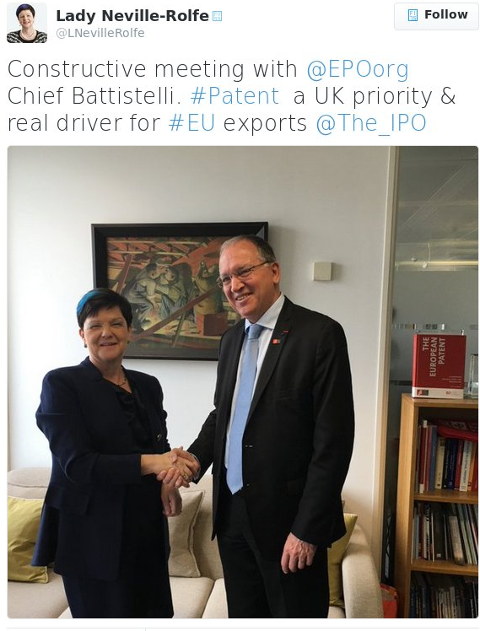
Summary: With trillions of dollars at stake (over the long run) the rich and the powerful, many of whom evade tax, continue to work behind closed doors (through agents or middlemen) in an effort to change the law in their favour while ordinary people are either uninformed or furious
THE EPO became an instrument of the rich and the powerful (perpetuating their wealth and power), which definitely isn’t what its creators foresaw or had in mind (way back in the EPC days).
Battistelli’s expected trip to London is starting to bear fruit (see this morning’s tweet from Neville-Rolfe) and maybe he can also pay a visit to his London lawyers who are threatening me (two legal firms in London).
“Battistelli’s expected trip to London is starting to bear fruit (see this morning’s tweet from Neville-Rolfe) and maybe he can also pay a visit to his London lawyers who are threatening me (two legal firms in London).”Techrights is quite frankly disgusted by Battistelli’s visit to the UK. He is not British, yet he is bending British law, and at the EPO he makes a mockery of British law while stomping on an Irish judge. To deport or extradite Battistelli would require him to be poor and less well-connected [1, 2, 3, 4, 5, 6]. These people, just like in Croatia, can seemingly get away anything. It’s all about one’s status; that’s why people like Julian Assange have an arrest warrant against them (also in London, where he continues to expose/publish rich people’s secrets) and Battistelli is treated like some kind of celebrity.
As we showed several weeks ago, Battistelli is expected to do some UPC lobbying over here. Now we have Bristows LLP staff (Annsley) doing an ‘article’ on Brian Cordery (Bristows LLP). The London-based IP Kat did what seems more like an ad, including UPC PR from Bristows LLP. What gives? Sites outside the UK do the same thing [via] because few people who work for very affluent people stand to gain from it.
“Techrights is quite frankly disgusted by Battistelli’s visit to the UK. He is not British, yet he is bending British law, and at the EPO he makes a mockery of British law while stomping on an Irish judge.”The other day we saw a legal firm citing Jane Lambert [1, 2], a loud proponent of the UPC. Lambert is used to spreading around the impression that irrespective of UK membership in the EU the UPC is inevitable, or some nonsense along those lines. Here we have lawyers quoting other lawyers for ‘support’: “Hopefully the United Kingdom won’t jeopardize the Unitary Patent project with a vote to withdraw the European Union, says Jane Lambert, barrister from 4-5 Gray’s Inn Square in London. ‘However, it could still continue without us’, Lambert told Kluwer IP Law in an interview.”
This ‘interview’ is more like PR or lobbying. It’s designed for perception-setting. Greedy patent lawyers in the UK lick their lips over the UPC, but at whose expense? They don’t mind crushing democracy (the public is not consulted at all) because it’s all about serving themselves and their very affluent clients. Many doubts about the UPC persist, even from people who are within this system. To quote this one new comment:
Final thought – is the Baroness’ interpretation of “European patent” (e.g. meaning just an EP(UK), and not the whole bundle) consistent with the prevailing interpretation of the opt-out scheme?
That is, if “European patent” in Article 83(3) UPCA is interpreted to mean the whole bundle, then how on earth is it that the same term is interpreted to mean something different in the context of Article 26 UPCA?
Another comment says: “The U.K. implementation is nonsense on stilts, but that is what is to be expected when you get a politically driven compromise that resulted in a UPC Agreement and UP Regulation that was not understood by those agreeing it. Let’s see what the courts make of it. It will be particular fun when someone is found infringing by the UPC for acts that a national court would not find infringing. This is the inevitable result of how the UK is proposing to implement the UPC and UP. The fundamental tenets are fundamental. The mental implementation will be fun and mental.”
These are the words of people who actually work in this field. Another comment says:
As far as I can figure, implementation of the UPP will mean that, instead of one (national) law applying to one patent in any given country, there will instead be at least three different laws of infringement to choose from.
For cases brought before the UPC, there will be two possible laws of infringement, namely: (1) for EPUEs, the national law applicable to EPUEs in the Contracting Member State identified under Articles 5(3) and 7 of the UP Regulation; and (2) for not opted-out EPs, Articles 24 to 29 of the UPCA, plus (if necessary) provisions from laws specified in Article 24 of the UPCA.
If we accept the view of the Preparatory Committee (as set out in their interpretative note on Article 83 UPCA), the national courts will, for both opted-out and not opted-out EPs, apply a different (third) law of infringement – i.e. the national law applicable to opted-out EPs.
There are plenty of EP applications that, at present, could qualify for unitary effect. For those applications, therefore, the applicable law will depend upon all of the following factors:
- whether a request for unitary effect is filed (possible up to 3 months after grant); and, for non-unitary (parts) of patents in Contracting Member States of the UPCA
- whether an opt-out is filed, whether the patent is effectively opted out via the commencement of a national court action during the transitional period and whether an opt-out, once filed, is later withdrawn.
Thus, for such patents, all three different laws of infringement are current possibilities. Further, there are many situations in which the law that will actually be applied will not be known unless and until a court action is commenced. This could even affect patents for which unitary effect is requested – as there remains a possibility for that unitary effect to be cancelled and for a national court action to commence.
As such, this situation reminds me of Schrödinger’s famous thought experiment – as we will not know what the result is (i.e. applicable law of infringement) until we “open the box” (i.e. litigate) and find out what the court decides. For such “Schrödinger’s patents”, the possibilities for clever tactics and forum-shopping abound!
The situation could be particularly confusing for those MSs (such as Germany and France) where there is no distinct national law applicable to EPUEs. Whilst the UK’s implementation clearly has its (arguable) flaws, you have to give the IPO credit for attempting to improve matters by providing specific laws for EPUEs and opted-out EPs.
Nevertheless, I have to laugh when I look at recital 25 of the UP Regulation – which appears to assume that introduction of the UPP will improve legal certainty. Much like what happened with the “Bolar” provision, the Commission clearly underestimated the ability of the Member States to create chaos from order!
Right now, as we pointed out before, the EPO’s foreign PR agency (FTI Consulting with a huge budget) is sponsoring UPC propaganda events.
Based on the following E-mail sent around Brussels a few hours ago, over here in Europe this US-based firm (FTI Consulting) promotes similar agenda using events:
From: “Utta Tuttlies [EACD]” [redacted]
Date: 7 Apr 2016 12:13
Subject: Invitation: EACD meets the EU – Expert panel discussion – 28th April 2016
To: [redacted]
Cc:
Dear [redacted],
The EACD cordially invites you to the second edition of EACD meets the EU which will take place on April 28th from 18.00 to 20.30 at FTI Consulting in Brussels. The expert panel discussion will focus on “How can communication help with boosting investment in Europe?”.
Boosting jobs, growth and investment is the no.1 priority of the Juncker Commission. With the Investment Plan for Europe, concrete steps have been taken at EU level to bridge the investment gap that emerged as a result of the economic crisis. How can communication help these efforts? How can investment projects and investors find each other? What can be done to improve business confidence? How can the role of different stakeholders such as the EU institutions, national and local governments as well as banks, companies and investors be communicated?
We hope to welcome you to this event! We also invite you to stay up-to-date and engage with us on LinkedIn, Twitter and Facebook with the hashtag #EACDmeetsEU!
With best regards,
Utta Tuttlies
Board Member
European Association of Communication Directors
Head of Press & Communications
S&D Group, European Parliament
Meet Our Panelists
We are delighted to announce our panelists who will come together to share their thoughts about how to promote investment in Europe. Bela Dajka, Head of Corporate Communication at the European Commission will moderate the session.
Luc Van den Brande, Member of the Committee of the Regions, Adviser to European Commission President Juncker for the outreach towards citizens
Miguel Gil Tertre, Member of the Cabinet of Vice-President Katainen, European Commission
Matteo Maggiore, Director of Communications, European Investment Bank
Ezio Fantuzzi, International Relations and Media, Asset Management and Real Estate, Generali Group
Venue & Registration
The event will take place at FTI Consulting, 23 Avenue Marnix, 1000 Brussels, Belgium and will be free of charge, compliments of the EACD and our partner, FTI Consulting.
To register, please go to:http://www.eacd-online.eu/activities/calendar/eacd-meets-eu-how-can-communication-help-boosting-investment-europe
Should you have any questions or concerns, please don’t hesitate to contact us via email at info@eacd-online.eu.
About Our Partner
FTI Consulting, Inc. is a global business advisory firm dedicated to helping organizations protect and enhance enterprise value in an increasingly complex legal, regulatory and economic environment. With more than 4,400 employees located in 26 countries, FTI Consulting professionals work closely with clients to anticipate, illuminate and overcome complex business challenges in areas such as investigations, litigation, mergers and acquisitions, regulatory issues, reputation management, strategic communications and restructuring. The Company generated .76 billion in revenues during fiscal year 2014. For more information, visit www.fticonsulting.com and connect with us on Twitter (@FTIConsulting), Facebook and LinkedIn.
Your Contact
Dear [redacted],
We hope to welcome you in Brussels for this event. Should you have questions or comments, please feel free to contact us at info@eacd-online.eu.
With best regards,
Stefanie Schwerdtfeger
EACD Coordination Team
37, Square de Meeûs
B-1000 Brussels
Tel +32 (0)2 219 22 90
stefanie.schwerdtfeger@eacd-online.eu
With more than 2,300 members from 42 countries, the European Association of Communication Directors is the leading European network for in-house communicators. In addition to central events such as the European Communication Summit, the EACD hosts Regional Debates and Coaching Days across the European continent, where participants have the chance to meet with their peers from the region and share communications-related experience and ideas with colleagues who also work on an international level.
If you wish to not receive further information on the EACD please unsubscribe here: http://reply.wm13.de/www.eacd-online.eu/unsubscribe/204617
FTI Consulting only pretends to be European (just like many corporations and lobbyists with offices in Brussels or London); it’s actually based in the US. That's where a lot or European patent law (including, potentially, the UPC if it ever becomes a reality) seems to be discussed these days. Talk about loss of sovereignty.
There are very powerful forces that engaged in law laundering (e.g. secrecy laws to indirectly help hide tax evasion) and UPC is one of those things. ISDS in TPP/TTIP is beyond our scope of coverage. Battistelli’s trip to the UK is a disgrace. It happens to coincide with culmination of anger at his Office. People don’t show up at work. There’s a strike. █
Permalink
 Send this to a friend
Send this to a friend
04.06.16
Posted in America, Europe, Finance, Patents at 7:51 pm by Dr. Roy Schestowitz

Source/GAP. The World Bank is renowned (or notorious) for many whistleblowers.
Summary: A look at the background of the external reviewer of investigations at the European Patent Office, where investigations are often a byword for union-busting actions and elimination of dissenting views
THE EPO continues to show a pattern of militarisation (see some recent examples), even when the Board and the Council ask for amicability and reconciliation. Another noteworthy point is that few in Battistelli’s management (if any) are actually scientists.
Is this a patent office (scientific) or just a brigade of multinationals with background in finance? Is it about imposition and domination or true leadership that accompanies staff interests and citizens’ interests?
“The external reviewer of EPO Investigation is Olivia Graham,” told us someone. “Where/when has she been Investigator?”
“It is worth noting that Sebastian Bauer from the Investigative Unit was “Ethics Officer” for the World Bank in Washington.”Olivia Graham calls herself (be careful, LinkedIn URLs can expose one’s identity to the person while logged in) “Ethics Advisor at International Monetary Fund, Washington” and claims to have spent 8 years in the US Military, then the World Bank, UN, International Fund for Agricultural Development (IFAD), and finally IMF.
It is worth noting that Sebastian Bauer from the Investigative Unit was “Ethics Officer” for the World Bank in Washington. If only ethics were the goal… the IMF connection (if any exists) to the EPO or Battistelli is Christine Lagarde [1, 2, 3, 4, 5, 6].
The UPC shouldn’t come as a total shock; it seems like people in positions of power at the EPO and around it are more interested in corporate interests than in science and they are willing to use force to stop those who stand in their way or politely question their agenda. █
Permalink
 Send this to a friend
Send this to a friend
Posted in Europe, Patents at 7:41 pm by Dr. Roy Schestowitz
Not the message below
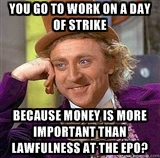
Summary: The Staff Committee and the initiator/s of the strike get a helping hand from SUEPO at The Hague, as quite a few SUEPO leaders have come under attack from EPO management in there
SUEPO’s E-mail to its members says a lot. It complements what we wrote earlier today [EN | ES]. They really know how to rally EPO colleagues and ensure that the minority — those who still don’t defend the representatives — would feel somewhat left out and find the courage to join the strike. SUEPO is getting the message across to more staff (those who are still on the fence or afraid to join the management’s opposition) in the following way.
“In an E-mail to its members,” told us one person “SUEPO The Hague had the following message today” (that’s the day before the strike)
Dear SUEPO members,
We invite you to wear once again a solidarity T-Shirts today : Wednesday 6 April.
Why? Despite the publication of the AC resolution three weeks ago (click here), Mr Battistelli has not acted. So far
o Els and Ion are still dismissed;
o Laurent is sick but under a disguised disciplinary sanction (cut of his remuneration);
o Malika is still severely downgraded,
o Aurélien Pétiaud and Michael Lund too,
o three other Suepo officials from The Hague are in the line of fire.
Wear your T-shirt for a few hours, at least when you go for lunch and show your solidarity with your representatives.
We take this opportunity to remind that SUEPO is not the initiator of the call for strike. However the SUEPO Committee supports the claims of the petition “Lawfulness at the EPO” and invites you to show solidarity and strike on Thursday 7 April. The strike registration tool is now working.
Your SUEPO Committee The Hague
Remember that at least one SUEPO leader at The Hague came under severe attacks (causing collapses), allegedly for ‘daring’ to study whether staff was happy (it obviously is not).
Christian Kirsch from Heise has covered the strike and summarised as follows: “Mit einer eintägigen Arbeitsniederlegung wollen die Beschäftigten erreichen, dass Disziplinarmaßnahmen gegen ihre Vertreter zurückgenommen werden. Zudem soll ein Mediator zukünftige Verhandlungen mit dem Management begleiten.” If anyone could kindly provide a human (not automated) English translation, that would be great.
It will be interesting to see how much awareness (e.g. press coverage) tomorrow’s strike will generate. Board 28 will be paying attention. It does not have Battistelli looking over its shoulder and it will meet in about a week. █
Permalink
 Send this to a friend
Send this to a friend
Posted in America, Courtroom, Patents at 7:20 pm by Dr. Roy Schestowitz
English/Original
Publicado en America, Courtroom, Patentes at 9:39 am por el Dr. Roy Schestowitz
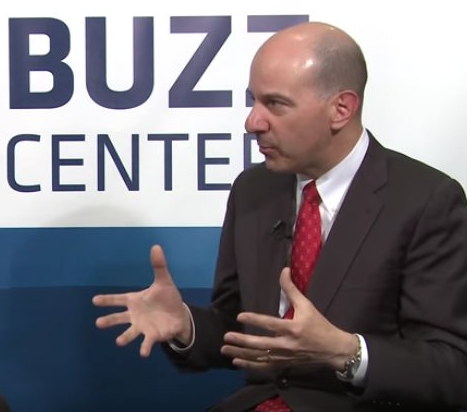
Fuente: entrevista 2013
Sumario: David Kappos se ha convertido de Director de la USPTO en un rávido proponente de patentes de software, al punto de desacreditar la intervencioón Congresional y los correctivos dictáments de la más alta corte de los Estados Unidos
Algunos oficiales públicos están actuado como profesionales (no importa el liderazgo de la EPO). Algunos academicos actúan profesionalmente también. El Profesor Dennis Crouch, por instancia, ahora se encuéntra a sí mismo crecientemente interesado en los casos de la Corte Suprema y él escribió acerca de un evento el Lunes (Propiedad Intelectual en La Corte Suprema): “Estoy deseando que llegue el TeleForum Sociedad Federalista este viernes, 8 de abril de, 2016 a 2:00 pm EST en el tema: Propiedad Intelectual en la Corte Suprema.”
“El Sr. Kappos es un abogado de patentes, un máximalista de patentes y cada vez más cabildea por los ricos y poderosos.”Con todas sus fallas sin embargo, La Corte Suprema de los US es razonablemente importante y altamente considerada, especialemente o más despues de que Antonin Scalia falleciese. ¿Quién sería lo suficiéntemente estúpido para enseñar/castigar a la Corte Suprema y incluso al Congreso? Aparentementee el antiguo director de la USPTO. !Qué falta de tacto!
David Kappos se quejó de SCOTUS en Nueva York hace una semana. No parece aceptar la realidad de que las patentes de software están muriéndo en los EE.UU., debido al histórico ruling de sus más altos jueces. Kappos no es un juez tampoco ha logrado mucho; simplemente pasó unos años en IBM, el cual es un notorio agresor de patentes, de allí saltó a la USPTO, cuyo cliente más grande era IBM. Ahora esta cabildeando por patentes de software, haciendo ganancias de ellas y escribiéndo papeles a favor de las patentes de software. Aquí esta el último de sus movimientos (“Law360 Opinion: Tiempo de que el Congreso deje Tranquilo al Sistema de Patentes, por David Kappos”).
“Talvez Kappos simplemente descubrió que hay más dinero en fama y cabildeo que lo hay en otros trabajos.”Para citar a Kappos: “El sistema de patentes de Estados Unidos ha sufrido una serie de cambios dramáticos en los últimos años, incluyendo aprobación y aplicación de la Ley de América Invierte el 2011, seis casos de la Corte Suprema de Estados Unidos que afectan a las leyes de patentes, nuevas normas administrativas por la Conferencia Judicial de Estados Unidos, y las acciones por la Federal Trade Comisión y estatales fiscales generales. Muchos de estos cambios eran necesarios para hacer frente a los abusos en el sistema, donde los frívolos juicios de patentes han sido utilizados por los “malos actores” para extorsionar esencialmente los pagos de las empresas después injustamente haber sido acusados de infracción. Sin embargo, los poderosos efectos de estos cambios emprendidos por múltiples ramas del gobierno sugieren fuertemente Congreso prudentemente puede dar un paso atrás a base de recortar aún más el sistema de patentes. Es hora de dejar que el sistema abrazar sus principales cambios recientes y funcionó cuestiones de aplicación antes de una nueva reforma sea considerada seriamente.”
El Sr. Kappos es un abogado de patentes, un máximalista de patentes y cada vez más cabildea por los ricos y poderosos. El incluso escribe documentos técnicos a favor de las patentes de software. ¿Cuándo va acabar todo esto? Es inapropiado ya que hace parecer que ambos IBM y la USPTO intervinieran con políticas y el trabajo de los jueces, incluso jueces de la Corte Suprema. ¿Talvez todavía este en la planilla de IBM? De otra manera como puede uno justificar sus acciones.
El otro dia los máximalistas de patentes (tambien grandes promotores de patentes de software) notaron que la renuncia de David Kappos [...] coincidentemente pasó poco después de que diera un fuerte discurso a favor de las patentes de software.”
“¿Cuánto más se puede permitir que estos oportunistas continúen jodiéndo?”Talvez Kappos simplemente descubrió que hay más dinero en fama y cabildeo que lo hay en otros trabajos” Verdaderamente tenemos la esperanza – ¿en vano? -de que se detenga. Esto desacredita todo el marco de patentes en los Estados Unidos.
De acuerdo a este nuevo artículo acerca PTAB la gente de la USPTO esta tratándo de “inclinar el campo de juego un poco hacia atrás en su favor.” Para citar en su totalidad: “Desde que entró en vigor en septiembre de 2012 los exámenes posteriores a la emisión introducidas por la Ley de Estados Unidos inventa han ayudado a hacer la vida mucho más difícil para los titulares de patentes de los Estados Unidos. La semana pasada, sin embargo, la USPTO ha anunciado algunos cambios en las normas que rigen el proceso que sólo podría inclinar el campo de juego un poco hacia atrás en su favor.”
¿Cuánto más se puede permitir que estos oportunistas continúen jodiéndo? Sin duda una gran cantidad de abogados de patentes están preocupados debido a que más patentes sólo significa más negocio para ellos, en el mismo sentido que más guerras significan más ganancias a los fabricantes de armas. “Varios jefes de nuevas empresas dijeron C y E que han perseguido a pesar de la protección de patentes de métodos comerciales y patentes de software que enfrenta un mayor escrutinio de patentes y Marcas de los EE.UU.” dice este nuevo artículo Más tarde culpa a Alice (en SCOTUS) al decir: “Estos movimientos se ajustan a un patrón, establecido por la audiencia Partners, de llevar a cabo las patentes de procesos que la mayoría de la gente en la industria creen que no pueden ser patentados. Por otra parte, van a venir en la estela de. Alice Corp. v CLS Bank International, junio 2014 sentencia del Tribunal Supremo que parecía apretar la elegibilidad mientras invalidaba algunas patentes de software y de métodos de negocios. De hecho, el Software Freedom Law Center, que representa a los desarrolladores sin fines de lucro, dijo en ese momento que la decisión era “un paso más hacia la abolición de las patentes de software.””
“A medida que el mundo se mueve más lejos de las patentes de software (incluyendo a los EE.UU.) Kappos está trabajando para hacer todo lo contrario.”Los abogados de patentes sólo prestan atención a Alice cuando las patentes de software resisten escrutinio, como otro nuevo artículo (“Un backslash de la Corte Alice: el Juez de Delaware Judge Robinson, Critical of Recent Trends, Mantiene las Patentes de Software en tres Casos”) ayuda a mostrar. Para citar: “¿La Tendencia? En aplicar § 101 desde Alice Corp. Pty. Ltd. v. CLS Bank Int’l., 134 S. Ct. 2347 (2014), las cortes han dado duro a las patentes de software. Las Cortes Distritales frecuéntemente citan a Alice para traer abajo las patentes de software. Como el Juez Robinson nota, El Circuíto Federal, por su parte, no ha implementado o sostenido una patente por ordenador bajo § 101 desde los DDR Holdings, LLC v. Hotels.com, L.P., 773 F.3d 1245 (Fed. Cir. 2014), la única victoria post-Alice para un dueño de patentes, emitida hace unos meses después de que Alice fue emitida. Van Busqueda Mejoarda 8 & n. 4 (citing eight Fed. Cir. decisions striking down computer-implemented patents).”
Saber que el Sr. Kappos es una clase de guerrero anti-Alice (en SCOTUS) estos dias nos ayuda a calificarlo como tal. A medida que el mundo se mueve más lejos de las patentes de software (incluyendo a los EE.UU.) Kappos está trabajando para hacer todo lo contrario. █
Actualizació: Reciéntemente nos ha sido indicado [1, 2] que Kappos ahora trabaja en un grupo frontal de varios prominentes proponentes de patentes de software, incluyendo IBM (su antiguo empleador), Apple, Microsoft, y HP – La Sagrada Familia -. El siguiente screen de pantalla se explica a sí mismo

Permalink
 Send this to a friend
Send this to a friend
Posted in Europe, Patents at 7:15 pm by Dr. Roy Schestowitz
English/Original
Publicado en Europe, Patentes at 5:22 am por el Dr. Roy Schestowitz
No vengas a trabajar y ayuda a la legalidad al hacerlo
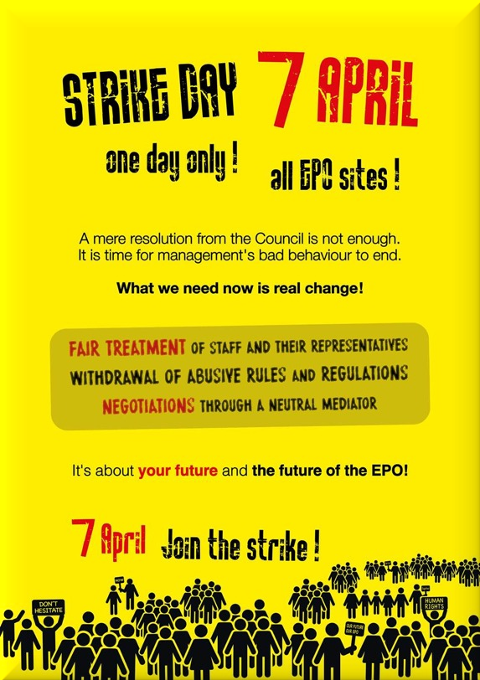
EPO bandera de huelga
Sumario: La huelga en la Oficina Europea de Patentes es un intento de restarurar legalidad al asumir en una perfecta y legal (bajo las estrictas reglas) huelga
La EPO necesita y merece cambio. Lo necesita para su sobrevivencia y sus empleados (exáminadores en su mayoría) merecen sus derechos restaurados. Un reportaje de Europa Central dice: “München (DK) Der Streit zwischen der Behördenleitung und den Mitarbeitern im Europäischen Patentamt (EPA) in München eskaliert.” (la disputa entre la gerencia y los trabajadores de la Oficina Europea de Patentes (EPO) en Munich se ha agudizado)
“Se trata de un proceso legal y de histórica protesta en contra de la ilegalidad de la gestión.”Muéstrales que mañana la Oficina entera pueda estar cerrada en un Jueves como si fuese Domingo. Esto enviará un fuerte mensaje a los tipos del jurado 28 una semana antes de su sorpresiva reunión.
No podré escribir muchos artículos esta semana (Estoy trabajando tres días seguidos hoy, así que no puedo trabajar en este sitio Web), pero para más detalles vean los PDFs reciéntementes publicados por la SUEPO (publicamos el texto hace un tiempo). Ya que algunos PDFs se relaciona a esto [1, 2] ayudan a mostrar, que la huelga de mañana es acerca de legalidad. Se trata de un proceso legal y de histórica protesta en contra de la ilegalidad de la gestión. █
“La última medida de un hombre no es dónde se encuentra en momentos de comodidad y conveniencia, pero cuál es su posición en tiempos de desafío y controversia.”
–Martin Luther King, Jr.
Permalink
 Send this to a friend
Send this to a friend
Posted in Europe, Patents at 5:22 am by Dr. Roy Schestowitz
Don’t come to work and help lawfulness by doing so

Summary: The strike at the European Patent Office is an attempt to restore lawfulness by engaging in a perfectly lawful (as per the overly strict rules) strike
THE EPO needs and deserves change. It needs it for its survival and the staff (examiners mostly) deserve their rights back. Some press coverage in central Europe says “München (DK) Der Streit zwischen der Behördenleitung und den Mitarbeitern im Europäischen Patentamt (EPA) in München eskaliert.” (dispute between the management and the employees of the European Patent Office (EPO) in Munich has escalated)
“It is a lawful process and historic protest against the lawlessness of the management.”Show them tomorrow that an entire Office can be shut down on a Thursday as though it was a Sunday. This will send a strong message to the Board 28 folks a week before their surprise meeting.
I won’t be able to write many articles this week (I’m working for the third day in a row today, thus unable to work on this Web site), but for more details see the related PDFs recently published by SUEPO (we posted the text quite a while ago). As some PDFs related to this [1, 2] help show, tomorrow’s strike is all about lawfulness. It is a lawful process and historic protest against the lawlessness of the management. █
“The ultimate measure of a man is not where he stands in moments of comfort and convenience, but where he stands at times of challenge and controversy.”
–Martin Luther King, Jr.
Permalink
 Send this to a friend
Send this to a friend




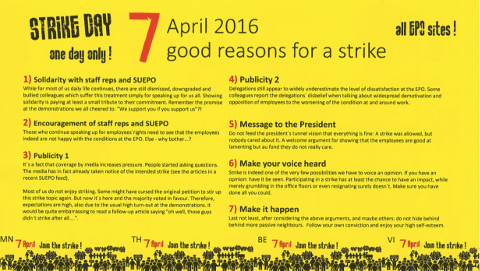
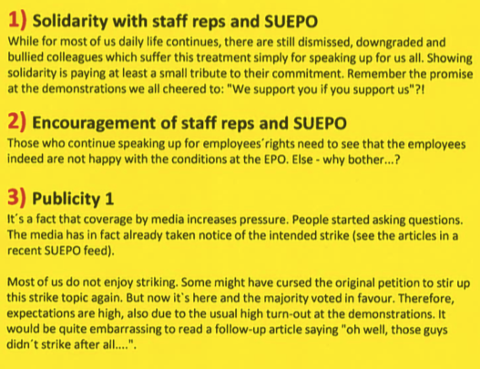
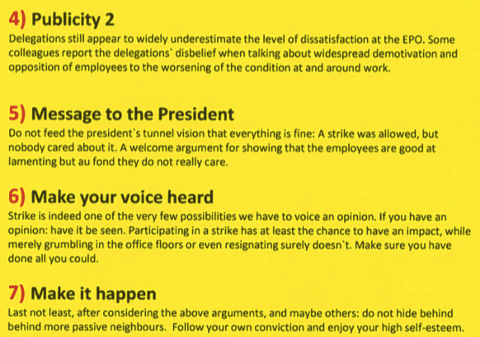



















 Content is available under CC-BY-SA
Content is available under CC-BY-SA